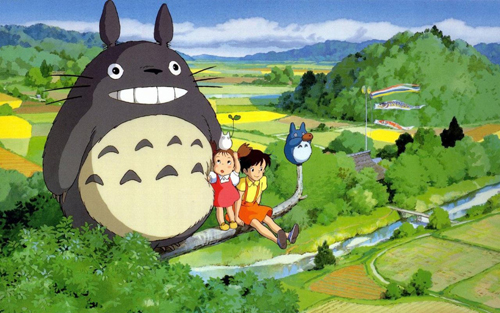Portland film geeks of all ages are in for a rare treat this month. Beginning Friday, the Northwest Film Center is celebrating Studio Ghibli by screening 13 films from Japan’s most famous and critically acclaimed animation studio.
Anime all the way

Portland film geeks of all ages are in for a rare treat this month. Beginning Friday, the Northwest Film Center is celebrating Studio Ghibli by screening 13 films from Japan’s most famous and critically acclaimed animation studio.
Studio Ghibli is practically synonymous with Hayao Miyazaki, the acclaimed writer and director of many of its biggest hits, including My Neighbor Totoro (1988), Princess Mononoke (1997) and Spirited Away (2003). Miyazaki’s fantastic imagination, deep humanism and inventive artistic eye have endeared him to legions of fans throughout the world.
“These films are so special and really unique. Every frame is a work of art,” said Ted Hurliman, exhibition program manager at the NWFC. “It’s like a slam dunk in terms of the films we try to bring.”
Many of the 13 films are generally considered to be anime classics, and all of them will be screened from new 35mm prints, giving anyone who discovered Studio Ghibli’s films on DVD a chance to experience them as they were originally intended: “We may never have a chance to see them like this again,” Hurliman lamented.
Studio Ghibli is headed by Miyazaki along with fellow director Isao Takahata and producer Toshio Suzuki. The studio was founded in the wake of the success of Miyazaki’s first masterpiece, Nausicaä of the Valley of the Wind (1984), a film that introduced many themes that have reappeared throughout Studio Ghibli’s catalog, including feminism, environmental awareness and moral ambiguity.
Although Studio Ghibli had already proven to be both a commercial and critical juggernaut in Japan, most American animation fans were unfamiliar with the studio’s work until Miramax released Princess Mononoke in 1997.
Set in an ancient Japan populated by fantastical creatures, forest gods and humans beginning to exert violent dominance over nature, the film quickly became a cult sensation. Despite it’s clear ecological themes, Princess Mononoke, like many of Miyazaki’s films, eschews moral simplifications and instead imbues all of its characters with believable and compelling motivations.
“[These films] have a large amount of respect for their audience,” Hurliman said. “What I love about them is that they do not adhere to the standard hero-princess formula. In most films there’s always a very predictable trajectory. When I look at a Ghibli film, there is no standard formula.”
Spirited Away, perhaps the studio’s best film, is certainly its most successful. This heartwarming movie about a young girl who becomes trapped in an alternate reality inhabited by spirits and other denizens of Japanese mythology won the Academy Award for Best Animated Feature in 2003 and still ranks as Japan’s highest grossing movie of all time.
Studio Ghibli, and especially Miyazaki, have had a profound impact on the American animation community. In a written tribute, John Lasseter, the CEO of Pixar and Walt Disey Animation Studios, said, “The most inspirational films for me are the animated films of Hayao Miyazaki…Toy Story (1995) owes a huge debt of gratitude to the films of Mr. Miyazaki.”
Lasseter is not alone. James Cameron has credited the Japanese filmmaker as being a major influence, as have the directors of DreamWorks’ Kung Fu Panda (2008) and Disney’s Mulan (1998).
In addition to a selection of Miyazaki’s beloved classics, the NWFC’s retrospective will also feature lesser known works from Studio Ghibli—a few of which have been hard to find or unavailable in the West until now—as well as three movies directed by studio co-founder Isao Takahata (though, sadly, not his heartbreaking 1988 anti-war, Grave of the Fireflies).
Highlights include Pom Poko (1994)—where magical shape-shifting tanuki (of Mario-suit fame) struggle to protect their home from urban development—and Whisper of the Heart (1995)—a bittersweet story of young love and a finding your place in the world.
For those who are already fans of Studio Ghibli’s work, this series is a no-brainier. But for those who haven’t, the NWFC’s retrospective may be the best opportunity to discover the whimsy, beauty and depth that permeate the studio’s films.
Studio Ghibli: A Retrospective
Whitsell Auditorium
1219 SW Park Ave.
$9 general; $8 students and seniors






